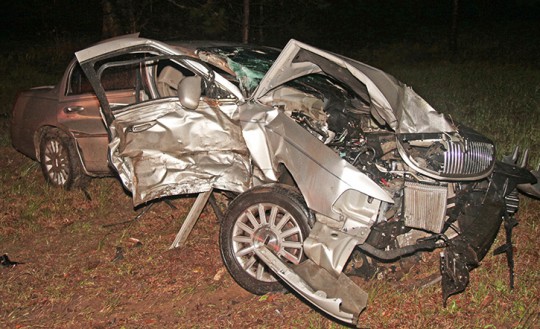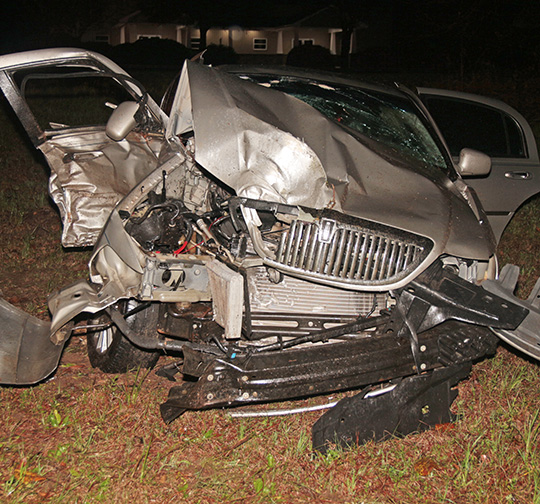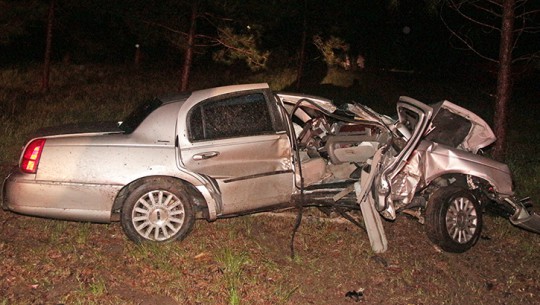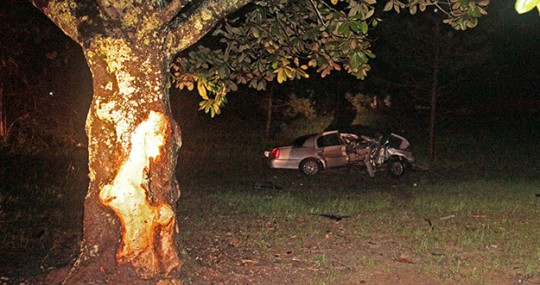Tornado Victims Should Have Property Tax Value Revised
March 20, 2016
Escambia County property owners that suffered storm damage are asked to contact the Escambia County Property Appraiser’s Office. The office will schedule and inspection to make any necessary adjustments in taxable value. Call the Escambia County Property Appraiser’s Office at (850) 434-2735. Pictured: Tornado damage on Jefferson Avenue in Century. NorthEscambia.com file photo.
Backroom Briefing: Replacing Jeff Miller
March 20, 2016
Washington may have lost its appeal for U.S. Rep. Jeff Miller, but the siren call of the city on the hill is luring a raft of other Panhandle officials poised to take his place.
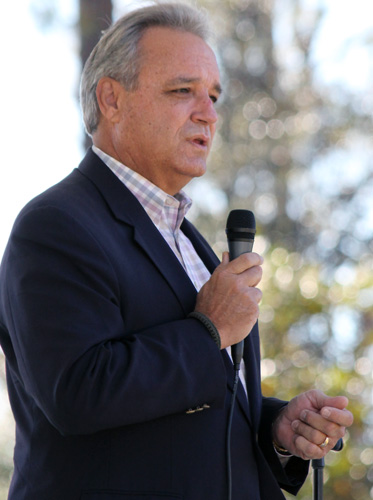 State Sen. Greg Evers, state Rep. Matt Gaetz and Escambia County Supervisor of Elections David Stafford all confirmed that they’re contemplating bids to succeed Miller, who announced a week ago that he won’t seek re-election after serving 15 years in Congress. Pensacola Mayor Ashton Hayward’s name is also among those bandied about by local insiders.
State Sen. Greg Evers, state Rep. Matt Gaetz and Escambia County Supervisor of Elections David Stafford all confirmed that they’re contemplating bids to succeed Miller, who announced a week ago that he won’t seek re-election after serving 15 years in Congress. Pensacola Mayor Ashton Hayward’s name is also among those bandied about by local insiders.
Evers is considered one of the Senate’s more-moderate Republicans, despite his predilection for sponsoring National Rifle Association-friendly legislation. He got that reputation, at least in part, because of anti-prison privatization votes and his alliance with Sen. Jack Latvala, a Clearwater Republican who’s consistently been a thorn in the side to Senate GOP leaders.
“I’m praying about it. I’m talking about it to my constituents and I’m definitely looking at it,” Evers, a Republican strawberry farmer from Baker, said.
Gaetz, currently running to replace his father in the state Senate, was equally coy in a telephone interview, saying he’s “considering it strongly” but hasn’t yet decided. Gaetz’s father, state Sen. Don Gaetz, earlier this week nixed the notion that the elder statesman would run for the seat, which stretches to the Alabama border.
“I’ve gotten a lot of encouragement from people all over Congressional District 1 and I’ll make an announcement very soon regarding my intentions,” Matt Gaetz, a lawyer who lives in Fort Walton Beach, said.
Stafford, who at one point served as chief of staff to Joe Scarborough during the MSNBC talk show host’s stint in Congress, was even more circumspect.
Stafford said numerous folks in the Panhandle have urged him to run for the seat, and, while he’s been “humbled by their encouragement,” he’s regrouping, at least for now.
“As you know, I’ve been focusing on the presidential primary and now that Election Day is behind us, Kim and I will take some time to discuss how best we can serve,” Stafford said in an email, referring to his wife.
When asked about running, Hayward said in a phone interview he “hasn’t ruled it out.”
Meanwhile, Gaetz and Evers poured on the Panhandle rhetoric, even before entering the race.
“The decision that I am working through is all about where the biggest challenges are that need solving. I’m happy with where we are in Tallahassee. We’ve balanced budgets. We’ve cut taxes. We’ve repealed or replaced over 4,000 regulations. I look at Washington and it’s a mess. I think that many of the solutions we’ve come up with in Florida are transferrable, to create more problem-solving at the federal level,” Gaetz said.
When a reporter noted that his remarks sounded like something a congressional candidate might say, Gaetz acknowledged, “It does.”
Evers said his constituents “need someone to pick up the same torch” Miller wielded for the military and veterans and to “be that lifeline through Washington to cut through the red tape.”
“To bring it down to a local level, that’s the vision that I feel like I’m the best one to represent in the Panhandle,” Evers said.
Miller’s exit could rearrange the deck chairs on the Panhandle political scene, creating opportunities for not just one but two Senate seats — Evers’ seat and the open seat now being sought by the younger Gaetz. At least three House members — Reps. Doug Broxson, Mike Hill and Clay Ingram — could be in the running for Evers’ Senate post, fueling even more speculation about their possible successors.
The congressional campaign will likely boil down to Evers, Gaetz and Stafford, if he chooses to enter the fray, according to Collier Merrill, a prominent Pensacola businessman and GOP donor.
“It’s going to create a tough race, but at the end of the day we’ll be well-represented,” Merrill said.
by Dara Kam and Jim Turner, The News Service of Florida
Pictured: Congressman Jeff Miller speaks in Century. NorthEscambia.com file photo, click to enlarge.
FDOT Suspends Road Construction Closures Along Spring Break Routes
March 20, 2016
To facilitate traffic for the thousands of travelers who converge on the state of Florida for spring break, the Florida Department of Transportation (FDOT) District Three office is suspending highway construction projects on major roadways along spring break routes across Northwest Florida. There will be no work on state roads requiring lane closures through Sunday, March 27, 2016. All major roads will be open to normal traffic.
 Although no construction closures are scheduled over the holiday weekend, existing work zones will remain in effect; drivers may encounter construction workers and reduced speed limits. Motorists are reminded to use caution while
Although no construction closures are scheduled over the holiday weekend, existing work zones will remain in effect; drivers may encounter construction workers and reduced speed limits. Motorists are reminded to use caution while
traveling through work zones and around barricades – equipment and temporary traffic configurations may remain in place.
FDOT is encouraging drivers to allow extra travel time and to use extra caution in existing work zones along state highways. Drivers are urged to make sure they buckle up, along with their passengers. FDOT and other safety agencies also ask drivers to obey speed limits, get adequate rest before traveling, avoid distractions and never drink and drive.
Drivers also are urged to be prepared for unscheduled highway closures due to accidents, disabled vehicles or other events. Motorists should be alert to changing weather conditions while traveling.
The lane closures suspension includes Highway 29 within the town of Century and from Champion Drive north.
Pictured: A recent lane closure in Century for a sidewalk project. NorthEscambia.com photo, click to enlarge.
‘Docs V. Glocks’ Arguments Set For June
March 20, 2016
A federal appeals court has said it will hear arguments in June in the battle about a 2011 Florida law that restricts doctors from asking questions and recording information about patients’ gun ownership.
The 11th U.S. Circuit Court of Appeals scheduled the arguments for June 21 in Atlanta, according to a document posted on the court’s website.
A three-judge panel has issued three rulings that upheld the law, with the most-recent ruling in December. But the full appeals court then decided to take up the issue in what is known as an en banc proceeding. The law, dubbed the “docs v. glocks” law, includes a series of restrictions on doctors and other health providers.
As an example, it seeks to prevent physicians from entering information about gun ownership into medical records if the physicians know the information is not “relevant” to patients’ medical care or safety or to the safety of other people.
The law was backed in the Legislature by Second Amendment advocates such as the National Rifle Association but faced heavy opposition from physicians. Critics argue, in part, that the law violates First Amendment rights.
by The News Service of Florida
Learn To Do Business With ECUA
March 20, 2016
The FSBDC Government Contracting Services at UWF, is offering a workshop entitled “How To Do Business With Emerald Coast Utilities Authority” on Wednesday, March 16th, from 9:00 a.m. until noon.
 Attendees will learn how to do business with Emerald Coast Utilities Authority (ECUA), how to register as a vendor and learn about upcoming events and bid opportunities. THe event will take place at the UWF Innovation Institute, Main Stage, 321 DeVillers Street, Pensacola. There is no cost for the workshop.
Attendees will learn how to do business with Emerald Coast Utilities Authority (ECUA), how to register as a vendor and learn about upcoming events and bid opportunities. THe event will take place at the UWF Innovation Institute, Main Stage, 321 DeVillers Street, Pensacola. There is no cost for the workshop.
To register, call (850)474-2528 or register online at www.sbdc.uwf.edu, click on “Training Opportunities”.
One Injured In Highway 97 Crash
March 19, 2016
One person was injured in a single vehicle crash Friday night on Highway 97 in Walnut Hill.
A driver lost control on Highway 97 north of North Highway 99 about 10:20 p.m., ran off the roadway, clipped a power pole and struck a magnolia tree before the vehicle came to a stop. One person was transported by Atmore Ambulance to Atmore Community Hospital with injuries that were not considered critical.
The accident also downed a electric service line, leaving at least one home without power.
The accident remains under investigation by the Florida Highway Patrol; further details have not been released. The Walnut Hill Station of Escambia Fire Rescue also responded to the crash.
NorthEscambia.com photos, click to enlarge.
Free Food Giveaway Saturday In Century
March 19, 2016
There will be a free food giveaway Saturday from 9 a.m. until 5 p.m. (or until all food is gone) at the Century Church of Christ on East Highway 4.
This giveaway, which includes a half-semi truck load of food, is for anyone in the Century, Flomaton or Jay areas. It not just for tornado victims.
Tornado victims may also inquire about additional assistance.
IMPACT 100 To Give Away Over $1 Million In Grants
March 19, 2016
IMPACT 100 Pensacola Bay Area, a local women’s philanthropy group, has announced that its 2016 Membership Drive has successfully concluded with a record of 1,082 members. The organization will give back to the community by awarding ten high impact project grants of $108,200 each to nonprofit agencies in Escambia and Santa Rosa Counties on October 16, 2016.
 This will be the 13th year that IMPACT 100 will award grants to local nonprofit agencies. After awarding the 2016 grants, IMPACT 100 Pensacola Bay Area will have funded 77 grants, totaling $8.318 million.
This will be the 13th year that IMPACT 100 will award grants to local nonprofit agencies. After awarding the 2016 grants, IMPACT 100 Pensacola Bay Area will have funded 77 grants, totaling $8.318 million.
“We are thrilled to have such a tremendous response from our community and we can’t wait to see what innovative projects the nonprofit agencies submit this year,”said Cyndi Warren, President of IMPACT 100. “Thanks to every one of our members, the Pensacola Bay Area shines once again as the largest Impact 100 organization in the world.”
Two grants will be awarded in each of the following five focus areas: Arts & Culture; Education; Environment, Recreation & Preservation; Family; and Health & Wellness.
Non-profit organizations interested in applying for a grant are invited to attend this year’s Nonprofit Education Workshop with guest speaker Quint Studer, founder of the Studer Group. He will present “Dream Big – Create IMPACT” at First Baptist Church, 500 North Palafox Street, on Thursday, April 26, 8:30 a.m. until 12:30 p.m. All nonprofit organizations in Escambia and Santa Rosa Counties are invited to learn about the grant process, get tips to writing a more successful grant, be inspired to dream big and create a winning project. Letters of Intent to Apply for a grant are due April 30. Grant Applications must be submitted by June 24.
Four Sentenced In Burglary Ring
March 19, 2016
Four co-defendants in a burglary were sentenced by Circuit Judge Ross Goodman to the following:
Johnnie Lee, 56 years old from Pensacola, was sentenced to life in prison on charges of gurglary of a structure causing more than $1,000 damage to said structure, criminal mischief causing over $1,000 damage and fleeing to elude a law enforcement officer.
Noral Scott, 54 years old from Pensacola, was sentenced to 50 years state prison on charges of two counts of burglary of a structure causing more than $1,000 damage to said structure, conspiracy to commit burglary, possession of burglary tools, and resisting arrest without violence.
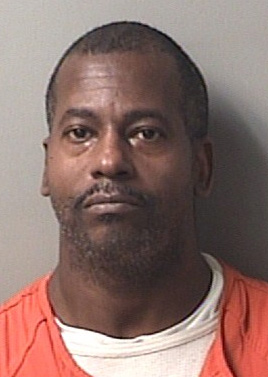 Markett Simpkins was tried and convicted of burglary charges from this case in December and was sentenced to 25 years in state prison by Circuit Judge John Miller. Donald Robinson pleaded no contest to the burglary charges on July 31, 2015 and was sentenced to 10 years state prison by Circuit Judge John Miller.
Markett Simpkins was tried and convicted of burglary charges from this case in December and was sentenced to 25 years in state prison by Circuit Judge John Miller. Donald Robinson pleaded no contest to the burglary charges on July 31, 2015 and was sentenced to 10 years state prison by Circuit Judge John Miller.
On November 24, 2014, officers from the Escambia County Sheriff’s Office and Pensacola Police Department were conducting surveillance on individuals involved in a string of business burglaries. Those burglaries involved breaking into safes and ATM units.
The surveillance led officers to the Eglin Federal Credit Union ATM located in the 8500 block of Navarre Parkway in the Soundview Plaza Shopping Center. Officers conducting surveillance saw three individuals: Noral Scott, Markett Simpkins, and Donald Robinson enter the building at the Eglin Federal Credit Union ATM while Johnnie Lee drove around as a lookout. When officers converged on the building, they discovered the suspects had cut a hole in the wall into an adjacent pet grooming business. Scott, Simpkins and Robinson were located in the attic of the pet grooming business and were removed by officers from the Santa Rosa County Sheriff’s Office SWAT team. Johnnie Lee was located in the neighborhood directly behind the shopping center and led deputies on a pursuit, ultimately ending when Lee collided with a sheriff’s vehicle.
Several wires were cut on the outside of the building to attempt to disarm the security system. Additional damage was done to the walls, doors and ceiling of the businesses.
Johnnie Lee was convicted of the charges by a Santa Rosa County Jury on March 2 and Noral Scott entered a plea to the charges on October 23, 2015. Lee has an extensive prior criminal record, including five prior burglaries, possession of burglary tools and multiple grand theft and dealing in stolen property charges spanning multiple decades back to 1979.
Scott also has an extensive criminal history, including a conviction for second degree murder in 1980. Both Johnnie Lee and Noral Scott are charged in several burglaries in Santa Rosa County which are set for trial on April 11, as well as burglaries in Escambia County set for trial on March 28.
Court Backs Use Of New Law In Death Penalty Cases
March 19, 2016
Florida’s new death-penalty sentencing process should apply to prosecutions that were already underway when the new law went into effect this month, a state appeals court ruled Friday.
 The 5th District Court of Appeal also decided that a U.S. Supreme Court decision, in an Escambia County case known as Hurst v. Florida, did not strike down the state’s entire death penalty as unconstitutional, but instead overturned the procedure for imposing death sentences.
The 5th District Court of Appeal also decided that a U.S. Supreme Court decision, in an Escambia County case known as Hurst v. Florida, did not strike down the state’s entire death penalty as unconstitutional, but instead overturned the procedure for imposing death sentences.
But because the issues “involve questions of great public importance,” a three-judge panel asked the Florida Supreme Court to decide whether the Hurst decision declared that the state’s death penalty is unconstitutional and if the new law applies to cases already in the pipeline before the new sentencing process went into effect March 7.
In a Jan. 12 ruling, the U.S. Supreme Court found that Florida’s system of giving judges, and not juries, the power to impose death sentences was an unconstitutional violation of defendants’ Sixth Amendment right to trial by jury.
The 8-1 U.S. Supreme Court decision dealt with the sentencing phase of death-penalty cases after defendants are found guilty, and it focused on what are known as aggravating circumstances that must be determined before defendants can be sentenced to death. A 2002 U.S. Supreme Court ruling, in a case known as Ring v. Arizona, requires that determinations of such aggravating circumstances must be made by juries, not judges.
The ruling left Florida temporarily without a death-penalty sentencing structure, prompting the Legislature to hurriedly pass a bill intended to fix the process. Gov. Rick Scott signed the bill March 7, and it went into effect immediately.
Under Florida’s new law, juries will have to unanimously determine “the existence of at least one aggravating factor” before defendants can be eligible for death sentences. The law also requires at least 10 jurors to recommend the death penalty in order for the sentence to be imposed, and it did away with a feature of the old law that had allowed judges to override juries’ recommendations of life in prison instead of death.
The Florida Supreme Court, which indefinitely put on hold two executions after the Hurst ruling, has been grappling with how — or whether — to apply the ruling to inmates already on Death Row. The questions posed Friday by the appellate judges are part of a process known as “certifying” questions to the Florida Supreme Court.
Friday’s ruling came in the consolidated cases of Larry Darnell Perry, accused of killing his 3-month-old son in 2013, and William Theodore Woodward, charged with murdering two of his neighbors in 2012.
After the Hurst decision, Perry and Woodward asked judges in their cases to bar prosecutors from seeking the death penalty. The judges agreed with the defendants’ lawyers, who argued that, because there was no constitutionally permitted death penalty process in Florida at the time, the state could not pursue death sentences in the cases.
But the appellate court on Friday sided with the state, saying that blocking the death penalty “impermissibly invades” the discretion of the state to seek the sentence.
The appeals court also rejected arguments that the new sentencing law should not apply in the cases of Perry and Woodward because of a 1972 law that provides alternative sentences if the death penalty is deemed unconstitutional. The 1972 law, which required that all death sentences be converted into life imprisonment, came in response to a ruling in a case known as Furman v. Georgia that resulted in a nationwide moratorium on the death penalty.
In the 10-page decision issued Friday, appeals-court Judge Richard B. Orfinger wrote that the Hurst ruling “struck the process of imposing a sentence of death, not the penalty itself.”
Orfinger, joined by judges Kerry I. Evander and F. Rand Wallis, also disagreed with the defendants’ contention that the application of the new law to pending cases would amount to an “ex post facto” violation of both the Florida and U.S. Constitutions.
That constitutional problem would only arise if the new law retroactively altered the definition of crimes or increased the punishment for the crimes, Orfinger noted.
While Florida’s new law changes the process used to determine whether the death penalty will be imposed, it does not modify the punishment attached to first-degree murder, Orfinger wrote.
“The new sentencing statute added no new element, or functional equivalent of an element, to first-degree murder. Hence, the changes to our capital sentencing procedures do not resemble the type of after-the-fact legislative evil contemplated by the ex post facto doctrine,” he wrote.
by Dara Kam, The News Service of Florida



